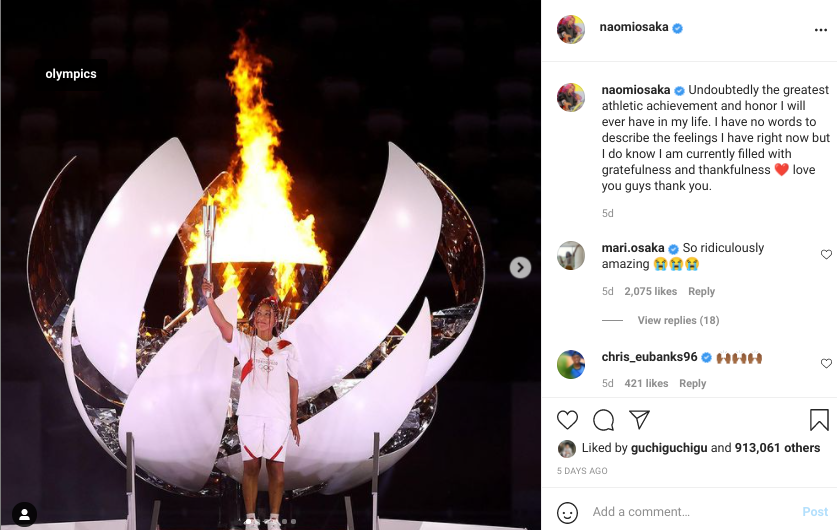By ANDREW DAMPF
AP Sports Writer

Naomi Osaka’s Instagram post from July 23
TOKYO (AP) — It wasn’t the ending that Naomi Osaka—nor her multitudes of fans across Japan and worldwide—had expected.
The start of the Tokyo Olympics, however, will forever be a bright memory for the tennis superstar.
Osaka herself said after lighting the Olympic cauldron during last week’s opening ceremony that it was “undoubtedly the greatest athletic achievement and honor I will ever have in my life.”
So maybe—just maybe—that will allow Osaka to cope with her unexpected 6-1, 6-4 loss to former French Open finalist Marketa Vondrousova of the Czech Republic in the third round of the Olympic tennis tournament on July 27.
Not immediately, though.
“I’m disappointed in every loss, but I feel like this one sucks more than the others,” Osaka said.
As a four-time Grand Slam champion, the highest-paid female athlete in the world and the host country’s poster girl for the Games, the huge expectations were hard to handle.
“I definitely feel like there was a lot of pressure for this,” Osaka said. “I think it’s maybe because I haven’t played in the Olympics before and for the first year (it) was a bit much.”
Osaka had talked earlier this week about how “happy” she was to be playing again. That came after she announced in May going into the French Open that she wouldn’t speak to reporters at that tournament, saying those interactions create doubts for her.
Then, after her first-round victory in Paris, she skipped the mandatory news conference.
Osaka was fined $15,000 and—surprisingly—publicly reprimanded by those in charge of Grand Slam tournaments, who said she could be suspended if she kept avoiding the media.
The next day, Osaka withdrew from Roland Garros entirely to take a mental health break, revealing she has dealt with depression and anxiety.
She sat out Wimbledon, too. So the Tokyo Games marked her return to competition.
“I’ve taken long breaks before and I’ve managed to do well,“ said Osaka, who initially did not comment after her loss, then came back out and met with a small group of reporters. “I’m not saying that I did bad right now, but I do know that my expectations were a lot higher.
“I feel like my attitude wasn’t that great because I don’t really know how to cope with that pressure, so that’s the best that I could have done in this situation.”
Whatever the final results on the court, Osaka already became part of Olympic history last week when she became the first tennis player to light the Olympic cauldron. She’s also one of the few active athletes to be given the honor. Australian sprinter Cathy Freeman lit the cauldron for the 2000 Sydney Games and went on to win gold in the 400 meters.
It was a choice that could be appreciated worldwide: In Japan, of course, the country where Osaka was born and the nation that she played for; in embattled Haiti because that’s where her father is from; and surely in the United States, because that’s where the globe’s highest-earning female athlete lives and where she has been outspoken about racial injustice.
Plus, everywhere in between, because Osaka is a superstar.
But she has often received an uncomfortable welcome in Japan because of her race, with her family having moved to the U.S. when she was 3. Her emergence as a top tennis player has challenged public attitudes about identity in a homogeneous culture that is being pushed to change.
Osaka wrote on Instagram next to a picture of her smiling while holding the flame. “I have no words to describe the feelings I have right now, but I do know I am currently filled with gratefulness and thankfulness.”



